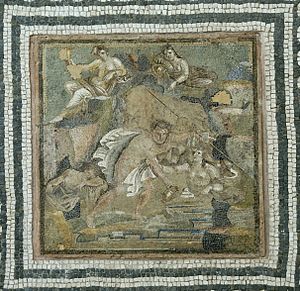Lympha
[4] Vitruvius preserves some of her associations in the section of his work On Architecture in which he describes how the design of a temple building (aedes) should reflect the nature of the deity to be housed therein: The character of the Corinthian order seems more appropriate to Venus, Flora, Proserpina, and the Nymphs [Lymphae] of the Fountains; because its slenderness, elegance and richness, and its ornamental leaves surmounted by volutes, seem to bear an analogy to their dispositions.
[15] In the Etruscan-based cosmological schema of Martianus Capella, the Lymphae are placed in the second of 16 celestial regions, with Jupiter, Quirinus, Mars (these three constituting the Archaic Triad), the Military Lar, Juno, Fons, and the obscure Italo-Etruscan Novensiles.
[22] As a complement to the Vires, the Lymphae and the nymphs with whom they became so closely identified embody the urge to procreate, and thus these kinds of water deities are also associated with marriage and childbirth.
[31] In the religions of ancient Greece, Rome, and the Celtic territories,[32] water goddesses are commonly sources of inspiration or divine revelation, which may have the appearance of madness or frenzy.
[33] The term also meant a physical snatching or abduction of a person by the nymphs, as in the myth of Hylas, and by extension became a euphemism or metaphor for death, as evidenced by both Greek and Roman epitaphs.
Vergil uses the adjective lymphata only once,[36] in the Aeneid to describe the madness of Amata, wife of Latinus, goaded by the Fury Allecto and raving contrary to mos, socially sanctioned behavior.
The adjective lymphatus was "strongly evocative of Bacchic frenzy,"[38] and the Roman playwright Pacuvius (220–130 BC) explicitly connects it to sacra Bacchi, "rites of Bacchus.
Onians explained the "fluidity" of the ecstatic gods in the context of ancient theories about the relation of body and mind, with dryness a quality of rationality and liquid productive of emotion.
[40] In his entry on Lymphae, the lexicographer Festus notes that the Greek word nympha had influenced the Latin name, and elaborates: Popular belief has it that whoever see a certain vision in a fountain, that is, an apparition of a nymph, will go quite mad.
